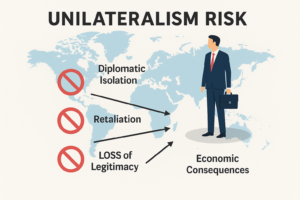Unilateralism Risk: Understanding the Dangers of Going It Alone in Global Politics
Introduction
In the interconnected world of the 21st century, no nation can operate in isolation without consequences. Unilateralism—acting independently without consulting allies or international institutions—might promise speed and control, but it comes with significant risks. For students preparing for CSS, PMS, and other competitive exams, understanding the unilateralism risk is essential to analyzing contemporary geopolitics.
What is Unilateralism Risk?
Unilateralism risk refers to the potential political, economic, and security setbacks that arise when a state pursues policies alone, ignoring multilateral consensus. While unilateral decisions can sometimes achieve short-term gains, they often trigger diplomatic isolation, retaliation, and legitimacy issues.
Key Risks of Unilateralism
-
Diplomatic Isolation
Countries that bypass allies or international organizations risk weakening long-term partnerships. -
Economic Repercussions
Trade partners may impose counter-tariffs, cancel agreements, or redirect markets elsewhere. -
Loss of Credibility
A state acting alone may be seen as undermining global norms, eroding its influence in world affairs. -
Security Instability
Military or strategic moves without coalition support can escalate conflicts and increase vulnerabilities. -
Retaliatory Measures
Other states or blocs may respond with sanctions, embargoes, or reciprocal actions.
Real-World Examples
-
U.S. Withdrawal from the Paris Climate Agreement (2017) – Criticized for undermining global climate goals.
-
Pre-emptive Military Actions – Often condemned as violations of international law.
-
Trade Wars – Unilateral tariffs leading to countermeasures from affected countries.
Why It Matters for Pakistan
For a country like Pakistan, balancing national interests with regional and global cooperation is critical. Unilateral moves in trade, foreign policy, or security could risk:
-
Losing valuable allies.
-
Straining economic agreements like CPEC.
-
Triggering regional instability, particularly in South Asia.
CSS/PMS Exam Tip
Possible Question: “Critically analyze the implications of unilateralism in modern geopolitics with examples.”
Suggested Approach:
-
Define unilateralism.
-
Outline risks with real-world cases.
-
Link implications to Pakistan’s foreign policy.
-
Suggest balanced strategies involving multilateral engagement.
Conclusion
While unilateral actions can sometimes deliver quick wins, the long-term consequences often outweigh the short-term gains. In today’s globalized environment, collaboration and coalition-building remain the safest and most sustainable paths to achieving national objectives.

